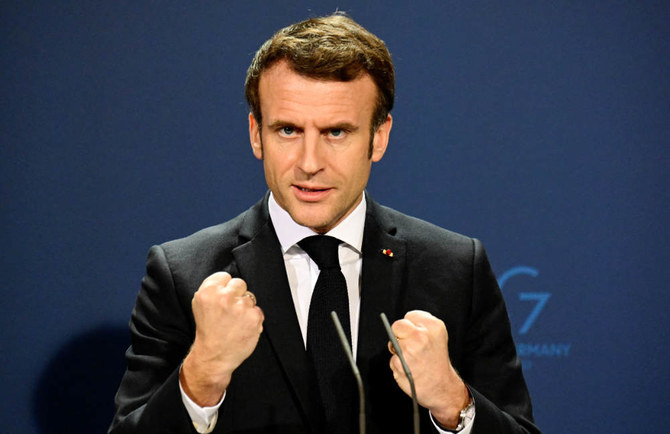Fatigued reformer Macron reined in by rivals

https://arab.news/rwa4e
Having emerged from relative political obscurity in 2017, Emmanuel Macron’s En Marche! movement set out to lead a transformation of France’s institutions and to address the inefficiencies of its burdensome state. Almost immediately after taking office, the fresh-faced reformer who chose to side with neither left nor right became known as an aloof, Jupiterian figure.
His top-down reforms resulted in a wave of mass protests and his plans to curtail state spending were put on hold as he spent nearly €500 billion ($512 billion) on furloughs, subsidies and tax breaks to cushion the economic effects of the pandemic. Even though he was elected for a second term as president earlier this year, he failed to win a majority in the subsequent parliamentary elections. With opposition parties refusing to take part in a coalition, Macron is now saddled with a minority government, putting his agenda for the next five years in jeopardy.
Following the loss of his parliamentary majority on June 20, Macron was heard groaning to his companions, complaining “we are all tired” after a long and bitterly fought election campaign. With his closest allies describing him as “dazed” and “absent,” it is clear that the president has run out of steam, much as his centrist coalition has done.
Macron’s erstwhile foes from his presidential bid, the far-right National Rally and the far-left New Ecological and Social People’s Union alliance, returned to avenge their loss in the parliamentary elections, winning 82 and 94 more seats in the National Assembly, respectively. This led to the president losing his social affairs and health minister amid a spike in COVID-19 infections, alongside other members of his Cabinet. Having steered clear of poaching major figures from opposition parties, as he had done previously, many wonder what will come of the president’s reformist agenda as he asks colleagues to “hang on” amid the political crisis.
Reform and liberalism are controversial words in France’s political lexicon. In a country where centrist and progressive politics are viewed as Anglo-Saxon imports, Macron always faced an uphill challenge transforming the status quo. As only the second of the Fifth Republic’s eight presidents to come from outside the Gaullist right or socialist left, his politics have won him more enemies than friends.
Nevertheless, Macron has been able to reform the country’s infamously cumbersome employment laws, reduce severance pay and end automatic pay rises and early retirement in certain state jobs, while also extending healthcare and providing welfare to a million more households. These “quick wins” gave his first term some semblance of achievement, but the large structural changes he needs to make remain unattainable.
Many wonder what will come of the French president’s reformist agenda as he asks colleagues to ‘hang on’ amid the political crisis.
Zaid M. Belbagi
Despite the controversy of these changes, Macron told his new Cabinet that France “needs reform and transformation and a spirit of compromise” after a post-election reshuffle. However, he presides over what is now arguably a bigger state than the one he took over. Industry has continued to decline as a share of France’s economic output and employment, while the country’s trade deficit has continued to widen. Government spending averaged 53.3 percent of gross domestic product between 1978 and 2021, reaching an all-time high of 61.4 percent in 2020, followed by 59 percent in 2021. The nimble, productive state that Macron set out to achieve remains a distant reality.
Now that the president will have to rely on other parties to get bills adopted in parliament, his agenda is in greater jeopardy. Last week, amid soaring energy prices and 5.8 percent inflation, France did what it does best and the National Assembly voted through a €20 billion package of emergency measures to dull the economic pain for households. Prolonging existing caps on gas and electricity prices, while raising pensions and social benefits, the package was announced despite a warning from the country’s public debt audit body about the concerning state of France’s public finances.
In a kowtow to the far left and far right, the president had no option but to agree to such spending, despite his Finance Minister Bruno Le Maire stating “we must make courageous political choices and not give in to the temptation of always spending more.” Nevertheless, given that Macron’s minority government is at the mercy of other parties and spending will increase, rising interest rates and France’s high debt and deficit levels warn of a country hurtling toward recession. The young disruptor who planned to save €60 billion by cutting public spending is unrecognizable from the president today overseeing the biggest cash injections of any state in Europe.
Where Macron has not shown fatigue, however, is in matters of foreign policy. Much as his crusade against radicalism and his foray into Lebanese affairs sought to distract from problems at home, he is now very much engaged in the conflict in Ukraine and has attempted to fill the void left by Angela Merkel’s departure at the EU level.
However, foreign policy divertissements can only work for a limited time. Critical to France’s long-term economic health and indeed its creditworthiness is stabilizing and reducing the debt burden, which is currently way over the EU average. Macron’s plans to harmonize business taxes and wages across Europe and to establish a central eurozone budget and European asylum office have been largely ignored by Berlin and Brussels. Ignoring problems at home or indeed seeking to make them continental issues will not work for a president who is much less fatigued than he is reined in by the rise of the far left and far right, whose ascent was made possible by public aversion to his reforms.
In the long term, neither party will win as the only direction a debt-ridden France will “marche” is backward.
• Zaid M. Belbagi is a political commentator and an adviser to private clients between London and the GCC. Twitter: @Moulay_Zaid










































